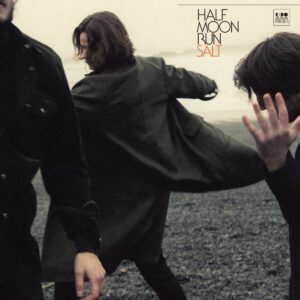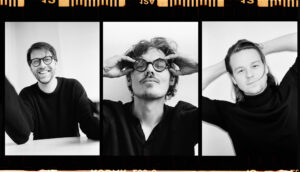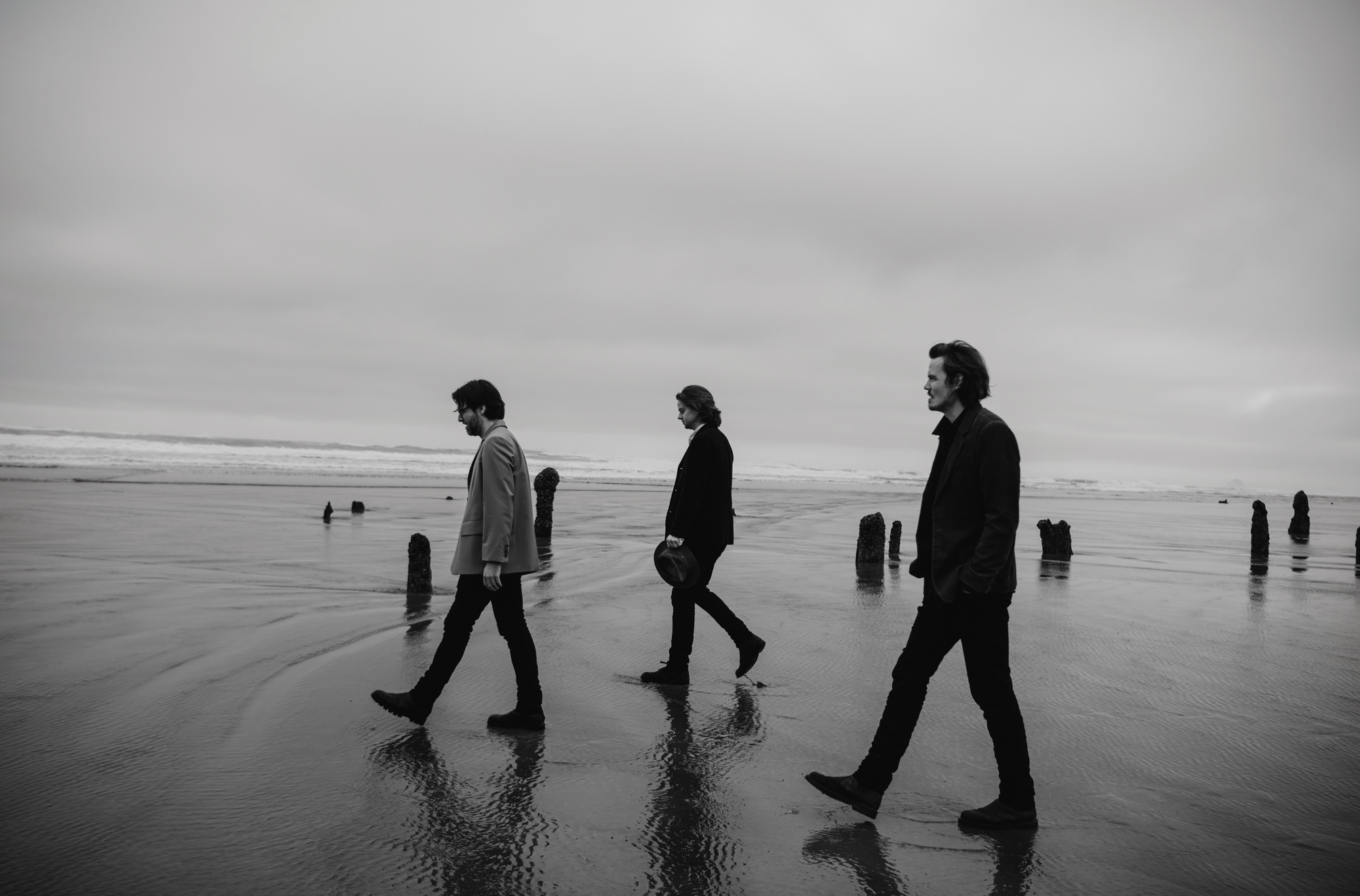 Foto-© Jennifer McCord
Foto-© Jennifer McCord
Ein Notizbuch mit genialen Einfällen, die man anno dazumal dringend festhalten wollte, aber nie wieder weitergedacht hat. Eine Melodie im Kopf, schnell aufgenommen oder niedergeschrieben, aber nie ausgeschmückt. Ein Nebenprojekt, das sich nie in den Vordergrund spielen konnte und jahrelang unvollendet blieb. Die meisten Menschen, sicherlich alle Künstler:innen, kennen diese unaufgeräumten Schubladen in unseren Köpfen.
Nach über zehn Jahren Bandgeschichte hat die kanadische Band Half Moon Run ihren persönlichen Ideen-Ordner entstaubt und daraus eine Art Album über sich selbst gemacht. Was bei dieser Reise zu sich selbst herauskommen sollte: Das Wesentliche, das Gute im Kern des gemeinsamen Projekts, das Salz der Erde. Salt, das neue Album der Band, das Anfang Juni erschienen ist. Bevor die Band ab nächster Woche auch hierzulande damit live zu sehen ist, haben wir sie mit unserem Bedroomdisco Fragenkatalog gelöchert – hier kommt unser Interview mit Half Moon Run sowie ganz unten auch unsere Verlosung zur anstehenden Tour!
– Band: Half Moon Run
– Band members: Devon Portielje, Dylan Phillips, Conner Molander
– Founding year: 2009
– Location: Montreal
– Album: Salt
Questionnaire:
First of all: thanks for taking your time to answer this mail! How are you and how were the last few months for you?
My pleasure! Thanks for the interview. The last few months have been spent getting our live show up and running and preparing for our big tours. We’ve had a few shows here and there which have really helped to bring things up to a level we’re excited about, and we’re really excited to bring it on the road.
During the pandemic you were quiet busy releasing EPs and also did some new versions of already released songs – how did this idea evolve and would you say that focusing on older material instead on working on new songs was easier as it felt like all living was on hold during that time anyway?
I wouldn’t say we were ever taking the easy route. I think the pandemic was a time of deep reflection and introspection, both as individuals and as a group. We actually were doing quite a few things concurrently during the pandemic. I think, in a way, we wanted to stay active in every way we could. Creatively speaking, we were both sharing new ideas with each other as well as opening old songs… just trying to go towards whatever sparked the most excitement. At first we were simply sharing emails and sessions with each other from home, but as soon as we were able to practice live again we took every chance we got. The pandemic was actually a crazy productive time for us, and we wrote quite a lot of new material on top of investigating our “graveyard” of old songs (which lives as a giant list on a whiteboard in our jam space).
Was this also the starting point on working further on songs from the past that weren’t finished before and became part of the new release record Salt?
There were certainly a few that we had started re-opening ourselves, but it wasn’t really until Connor Seidel came on board as a producer that we started to dive even further into our old ideas. He pushed us to open every single demo / riff / idea that we’d ever recorded in any way, and to make new demos and give everything a fair chance for consideration. I think the initial list was about 80 songs which had a fair number of brand new things we had been working on as well as our collected favourites from old ideas.
Can you describe a bit the production process of Salt, how, when and where it came into life, what was the best/what the worst moment during production and what is the most told anecdote of that time?
I think the best part of the production process for me, was the process itself. In the past – on previous albums – we became somewhat hyper-focused on getting to the result, and would struggle to enjoy ourselves along the way sometimes. We would sometimes leave studio sessions feeling like we’d lost years of our lives with the stresses of constantly battling to find the perfect recording. On “Salt”, we quickly reached a point with Connor where the work we were doing was just so much fun, and it felt like every time we met up, things naturally just came together. We took things week by week / month by month and bounced back and forth between Connor’s studio (the Treehouse Studio) outside of town and our own mini-studio setup at our jam space, and just kept inching things forward with plenty of breathing room in between sessions to listen and think about the things we did. It felt easy even though we probably put in more time working on this album than any other album we’ve done in the past. We’d sometimes stay up so late at the Treehouse studio that we’d just sleep over on the couches there to get right back at it in the morning.

For the record you did work with Connor Seidel as producer – why did you choose to work with him and which influence did he have?
Connor had invited us to do a song on his own project called “The 1969 Collective”, which was an idea he had to invite a lot of different artists to contribute an original song, recorded in the style of folk music from the late 60s. That was our first experience working with him, and we all remember how quickly and easily that song (“Fatal Line”) came together. We recorded it live off the floor, and his ideas really mixed with ours in a way that created positive feedback loops. I think the best part about working with Connor was that we really all felt like equals in the studio. Sometimes a producer can come in and become a dictator, but in Connor’s case, he recognized that the 3 of us in the band are bursting with ideas, and he took great care in trying to help us realize our own ideas as well as offering quite a few of his own (on top of being a world-class engineer). He felt like our 4th member of the band, and we’ve become great friends in the process.
Before the recording of the record Isaac left the band – how did this change the recording process of the new songs and did it also change the roles of the remaining band members during writing/recording and if so, how?
With the departure of Isaac, we did talk as a band about what that would mean for us going forward. One thing that we couldn’t help but think of is that we’re now back to the original 3 members of the band. Granted, we’ve changed a lot as people and as a band, but we had already had proven chemistry and success as a three-piece when we did our first record Dark Eyes. We really didn’t know how / if things would work, but after writing / recording the EP Inwards & Onwards completely ourselves, it definitely put the wind back in our sails and gave us the boost of confidence we needed to embark on “Salt”.
We read that the beginning of the single Alco was already in 2012 – how come that you were returning now to that part, what did it take you now to finish the song?
We had always absolutely loved the song Alco, but for whatever reason, after many different attempts to finish / record the song in the past, we just never felt like we “got it”. Alco is a song that needs the right balance between folk / pop / electronic elements. It also risks being too crowded with parts and layers. Connor Seidel really helped us to rethink our approach, and we ended up trimming a lot of fat and reducing it to its most essential parts.

We also love the song Hotel in Memphis and feel some casual Spoon-vibes – could you tell a bit how it was done, what’s it about and what’s the story behind it?
Hotel in Memphis was from an idea that originated even before Dark Eyes. This song, though it had taken many forms over the years, had been a curse for us across every full length album we’ve done. When we were recording Dark Eyes, I remember as a band deciding that the song just didn’t represent us. We were ready to move on and forget it ever existed. Our producer at the time sat us down one day and told us “you have to do it”… We clearly understood that this was coming from pressure from the label. So on one intense afternoon, we walked out into the forest, got around a cell phone on speaker, and called our label. We got so heated about the situation that we threatened to walk away and never speak of Half Moon Run ever again if they were to make us record that song. Every record since, we’ve given a fair shot at it, trying to change the feel to better suit us, and every record until now, we had failed. In a way though, I think we just weren’t ready or mature enough as musicians and collaborators to get it right until now. The bones of the song have always been great, but it just took us a long time to bring out the best in it. I’m really glad that we held out for all these years, because it really landed in its right place on “Salt”
Overall the sound of the record feels much more open and varied throughout the record – was this the plan from the beginning or did this evolve during the recording plus what do you like about having songs which are so different on one record?
Certainly from the moment we opened our options to a range of 15 years of written music, we knew there would be quite a lot of variation. That being said, I think we’ve always had a diversity of musical interests in the band, from folk to indie to electronic to classical / jazz, and have always loved exploring new things. “Salt” just gave us a chance to explore not only so many different styles and ideas, but also younger versions of ourselves. In some cases, we felt like an old / almost lost or forgotten tune was actually a gift from our younger selves to our current selves.
As you are coming to Germany on tour soon – how are you planning on doing the coming live shows, after Isaacs has left? Will you have someone to fill his role or are you rearranging the older songs for the upcoming shows?
We will be in Germany this fall and are very excited to be coming back! We won’t be filling Isaac’s role with another person, but we have, I think, achieved something even better as a three-piece. We also are all multi-instrumentalist and in most cases managed to just do more at the same time to cover Isaac’s parts. As three on stage, I think we’re really able to play off each other, and there’s no lack of energy. It was also exciting to build a setlist out of so much material to choose from. We have many new songs from “Salt” in the show, but also a selection of our favourites from past albums. In some cases, it was a challenge to figure out how to achieve the right format as a three-piece, but we’ve put a lot of work into it and are proud of the show we’ve put together.
Whats next on your schedule?
We’ll be touring UK / Europe / USA / Canada this fall!
What are you doing when you’re not doing music?
Personally, I love communing with nature and taking every chance I get to be close to the ocean / rivers / forests that I can. Big fan of camping and hiking.
Which song makes you dance every time?
From our own music, Goodbye California is the clear winner (we called it a “barn-burner” in studio haha)
Half Moon Run Tour:
21.09.23 Köln, Live Music Hall
28.09.23 München, Freiheitshalle
29.09.23 Mannheim, Alte Feuerwache
30.09.23 Berlin, Festsaal Kreuzberg
03.10.23 Hamburg, Fabrik
In Kooperation mit FKP Scorpio verlosen wir 2×2 Gästelistenplätze für die anstehenden Deutschland-Shows von Half Moon Run – ihr wollt hin? Dann schickt uns bis zum 19. September eine Mail mit dem Betreff „Half Moon Run + Stadt, wo ihr zum Konzert wollt“ und eurem Namen an gewinnen@bedroomdisco.de und mit etwas Glück habt ihr Anfang nächster Woche schon frohe Gewinnkunde von uns in eurem digitalen Postfach!











